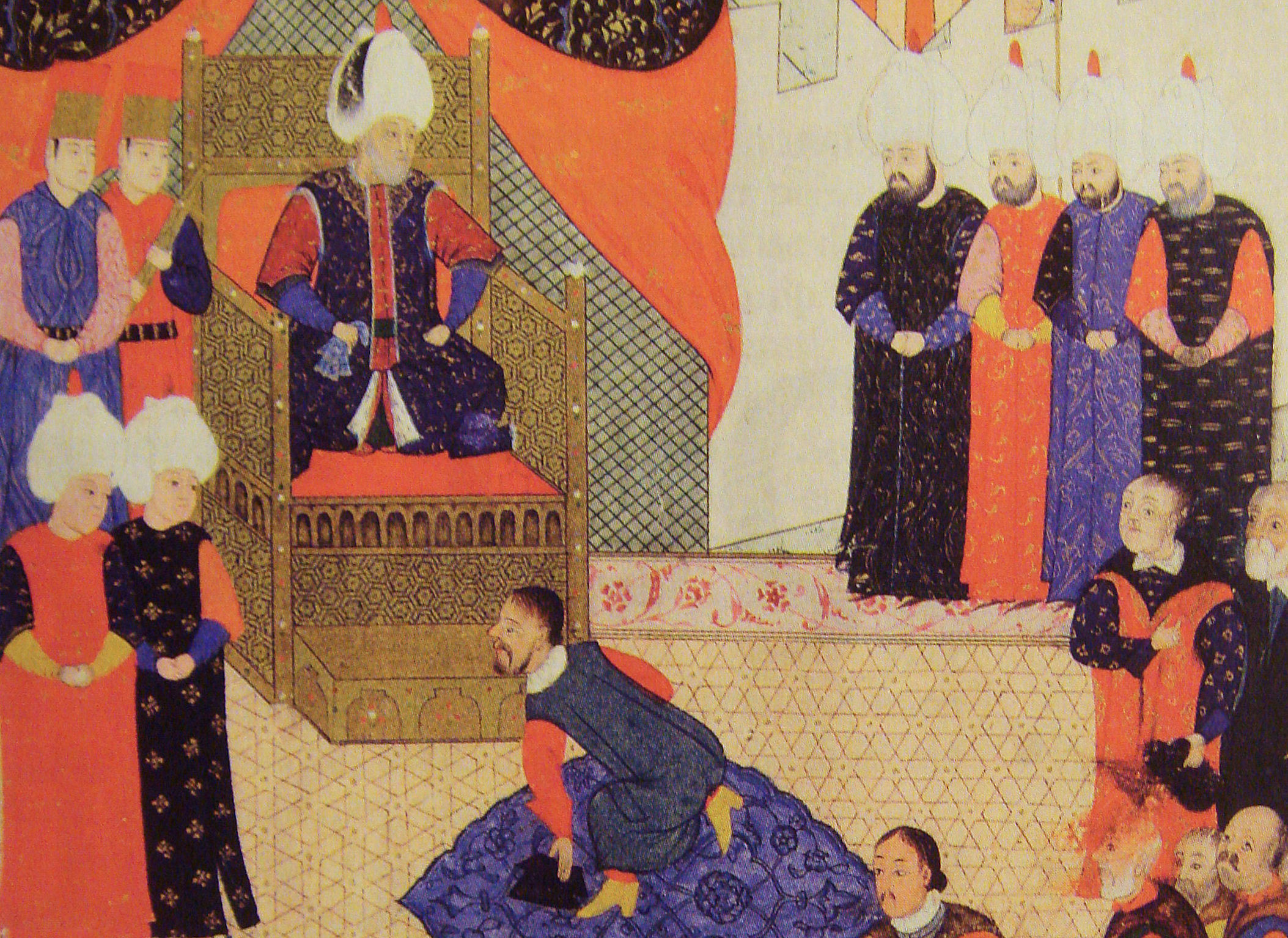The "Christian Turks" - Encounters in the Ottoman-Hungarian Contact Zone

On 23-24 May 2014 a workshop at the Central European University in Budapest was dedicated to the "Christian Turks" - Religious and Cultural Encounters in the Ottoman-Hungarian Contact Zone. The workshop was convened by Professor Gerard Wiegers and it brought together a number of outstanding scholars and experts in the field from Hungary, Germany, the UK and the US. Converts, renegades, and spies, religious polemicists and advocates of peaceful co-existence and religious toleration in central Europe were the object of the talks.
Introduction
Abstracts
Pál Ács - Alvise Gritti and Tamás Nádasdy. The History of a burnt-out Friendship
Alvise Gritti (Constantinople 1480, September 29 - 1534 Medias Medgyes) was influential in the Hungarian Kingdom under the reign of King John I of Hungary. He was also a minister of the Ottoman sultan, and regent of Hungary from 1530 to 1534. He was the natural son of Andrea Gritti, the Venetian Bailo in Constantinople during the reign of Sultan Bayezid II, who later became the Doge of Venice in 1523. “Popularly known as Prince's Son, this Turkified Venetian lived in regal pomp at his Italianate palace outside Pera, which featured quarters for slave boys, a harem, and stables” – Necipoglu writes. In this paper we examine the extremely quickly changing fate of Gritti in Hungary. In particular, we focus on the relationship one of the richest Hungarian landlord and politician, Tamás Nádasdy, to Gritti. Recently we could see intensified Hungarian, Italian and Turkish researches on Gritti and Ibrahim Pasha. Unfortunately, researchers from different countries hardly know each other's work. My aim is to interpret the particularly fast disaffection of Gritti and Nádasdy in the mirror of the Hungarian, Italian and Turkish sources and scholarly works. I also would like to prove that Gritti’s bad fame in Hungary was not the opinion of the contemporaries, but of the posterity
Pál Ács (view profile)

Gábor Almási - The question of Ottoman orientation in the propaganda and politics in the age of Gabriel Bethlen
During the Thirty Years’ War Gabriel Bethlen acquired international significance through his association with the Ottomans. Ottoman friendship was, however, a double-edged sword. This study analyses the ways this friendship became the centre of anti-Bethlen – but also anti-Calvinist – propaganda, fitting to the established topos of Turco-Calvinismus. The claims about the Muslim religion of the Calvinist prince of Transylvania, his faithlessness and unreliability were harsh and have remained bothering for Hungarian historiography ever since, in which nonetheless Bethlen has developed into a national hero. These claims questioned both his sovereignty and Christianity. Being based on anti-Ottoman sentiments their message was simple and straightforward, addressing neutral or hesitant potential partners of the Palatinate.
It is obvious that the geo-political situation of Hungary, and especially of Transylvania, was not simple at all, and the alternative of Ottoman association (or friendship) was real, with all the consequent difficulties. It is also clear that the image of the Ottomans as “arch enemies” of Europe was not only the question of religious sentiments but also of complex political interests, which, as a matter of fact, coincided with the goal of Hungary’s liberation from Ottoman rule. However, the alternative of Ottoman orientation became a burning political issue after Bethlen’s (bloody) succession to the throne of Transylvania; no wonder that it was soon in the centre of anti-Transylvanian propaganda directed by Cardinal Klesl. Bethlen’s politics could easily appear to contemporaries as hazardous, while the Habsburgs were worried of Transylvania’s gaining strength and becoming more independent also because
of their Counter-reformation goals in Hungary. Accusations of Bethlen’s “Turkish” habits and mind were thus no novelty at the outbreak of the Thirty Years’ War; the novelty lay rather in the new methods and functions of propaganda (e.g. the use of sarcasm, the presentation of original documents etc).
The paper presents the origins, functions and methods of this propaganda, and follows some of the famous propaganda campaigns between Catholics and Protestants, like the ones generated by the Anhaltische geheime Cantzley or the Secretissima instructio. It raises the question about the influence of this rhetoric against Bethlen, and presents some examples the Ottoman orientation was defended by Protestants – e.g. by the Latitudinarian Georg Tschernembl, the ‘politic’ Thomas Roe, or Ludwig Camerarius. Finally, it investigates the possible reasons why an apologetic literature hardly existed in Hungary and concludes that the accusations about Ottoman orientation were difficult to refute partly because they were partially true (and used as a weapon by Bethlen), and also because Ottoman orientation had real advantages.
Mihály Balács - Turcopapismus, Calvino-turcismus, Serveto-turcismus, Turcismus philosophorum
The purpose of this paper is to explore when, and with what kind of connotations the expressions listed in the title (or their Hungarian equivalents) first appear in 16th-17th century Hungarian and Transylvanian texts. Since, as we all know, in East-Central Europe most of these expressions were adapted from the West, an inquiry into the junctures of reception seems to be a legitimate undertaking. We would like to examine whether the meaning of the terms underwent any modifications during their reception, and in case there is a significant change in their connotation, in what context such transformations had taken place. We put particular emphasis on those Hungarian texts which were distributed among wider audiences, like sermons, polemical pieces and other occasional texts.
The second part of the essay is historiographical in nature. Here, we would like to explore the extent to which such topoi could prove persistent in the long run. The paper investigates whether the expressions were still in use at the beginnings of modern history writing in the second half of the 19th century, and if their presence can be registered in the language of the formulating critical literature of Hungarian cultural- and church history. During this examination, we focus on the absence or presence of denominational peculiarities, let alone certain biases in the use of the expressions, and how all these are reflected in contemporary Hungarian critical literature.
Nora Berend - George of Hungary and Islam
George of Hungary was captured by the Ottomans in Transylvania and spent many years in the Ottoman Empire as a slave. He eventually returned to Europe and became a Dominican and wrote a polemical work against Islam. He gave an unusually positive image of Islam, not only of the social customs of the Empire, but also of religious practices, only to conclude that these seeming merits were tricks in order to lure (Christian) believers into eternal damnation. This paper will explore George's portrayal of Islam and his views in detail in a comparative perspective.
Tobias Graf - “God Recognizes Every Man’s Heart”: Conversion to Islam between Confessionalization and Religious Indifference in the Late Sixteenth Century
From 1593 until 1606 the Ottoman and Austrian-Habsburg empires were engaged in a protracted and ultimately indecisive war in Central and South Eastern Europe. At the height of diplomatic tensions in the spring of 1593, the steward of the Habsburg embassy in Istanbul, a certain Ladislaus Mörth, embraced Islam. Although there is little information about his life either prior to coming to Istanbul, as part of the household of the then-ambassador Friedrich von Kreckwitz, or after his conversion, his change of faith itself is unusually well-documented in Christian-European sources.
In this paper, I will inquire into Mörth’s motivations for conversion to Islam. I will suggest that Mörth may have been religiously indifferent and that his very indifference, although paradoxical at first glance, supports the view, proposed first and foremost by Tijana Krsti?, that the Ottoman Empire experienced processes of confessionalization.
Gizella Keserű - The use of Turkish in Transylvanian Unitarian literacy at the turn of the 16-17th century
International criticism seems to have little awareness of the fact that the multifarious Transylvanian Unitarian movement has also produced various documents in the subject highlighted in the title. Different concepts are present with particular strength in the first years of the long Turkish war, when the life of the Principality suffered dramatic changes. One type within the eschatological trend was the movement which developed from the most moderate Christological position, and found the highest number of followers among the Saxon denomination of Kolozsvár. Even a letter has come to surface which Erasmus Johannis, the main proponent of this view wrote to Béza, where he draws on arguments close to the historical concept of the Wittenberg school, and places the East-Central European events into an apocalyptical frame where the advancement – but also the final defeat – of the Turks is inevitable. A sharp contrast, however, is represented by the opinion of György Enyedi, who could be regarded as a moderate follower of Iacobus Palaeologus. Refraining from any kind of apocalyptic expectation, in his Hungarian tracts and sermons, he provides a new interpretation of the Central-European presence of the Turks that differs from the Wittenberg tradition. He does not see a sign of the final times in that presence, but instead, based on the allegorical interpretation of certain Old Testament books, encourages the believers to accept that presence as a realistic long-range possib
Gábor Kármán - Islamic Sources of Religious Tolerance in Transylvania? Some Critical Comments
My paper offers a critical rereading of Susan Ritchie’s influential paper “The Pasha of Buda and the Edict of Torda: Transylvanian Unitarian/Islamic Ottoman Cultural Enmeshment and the Development of Religious Tolerance”, which argues that the religious tolerance established in sixteenth-century Transylvania was strongly related to the fact that the region came under Ottoman rule: the well-known religious tolerance of the Ottomans must have had an impact upon the legislation which allowed the free exercise of faith – not only upon its spirit, but also upon the wording, to which she finds a parallel in a document issued by the Pasha of Buda twenty years before the famous Edict of Torda. I will argue that the nature of sources we have about the Ottoman interference with Reformation does not allow us to draw very far-fetched conclusions concerning a “cultural enmeshment” and its influence upon Transylvanian legislation at any significant level. The Protestant theologians’ accounts about the benevolence of Ottoman dignitaries are just as ideologically loaded and have a politically oriented agenda as the, admittedly fewer, reports about the strive of Ottomans to aggressively convert people.
Noel Malcolm - Adam Neuser among the Renegades
Adam Neuser, the anti-Trinitarian who formally converted to Islam after his arrival in Istanbul, spent his last years there in a social and mental world that is difficult fully to reconstruct. Many of his circle – such as the Transylvanian Markus Benkner – were also ‘renegades’ from Christianity. Sometimes held in suspicion by native Muslims, and often denounced by visiting Christians from the West, they occupied an ambiguous position, both socially and in religious terms. This paper considers the varieties of religion and irreligion that existed among the renegades in Istanbul in the second half of the 16th century, and seeks to situate Neuser in their world.
Martin Rothkegel - Levantine backgrounds of Jacobus Palaeologus’s Unitarian Theology
“God is One, and Jesus is His Anointed” – this formula contains, according to the Greek-Italian theologian Jacobus Palaeologus, the entire Christian faith necessary for salvation. It is not by chance that the wording resembles the Islamic shahādah. In fact, Palaeologus argued that Christianity and Islam are but one religion, differing on the surface due to distorting historical developments, but congruent in the substantial doctrines and commandments. In his “De tribus gentibus” (1572) which was made known to a wider public by Antal Pirnát in his groundbreaking study of early Transylvanian Antitrinitarianism published in 1961, Palaeologus proposed a radically reductionist redefinition of Christianity that would include the Muslims and even the Jews, insofar as they profess the messianity of Jesus in an analogous way as the Muslims do. Palaeologus, a former Dominican friar from the island of Chios who lived as an exile in Bohemia, Poland, Transylvania and Moravia between 1561 and 1582, obviously hoped that his proposal of a radical reform of the Christian religion would open the way for a reintegration of Islam into Christianity and for a permanent Habsburg-Ottoman settlement. While these large political aspirations completely failed, Palaeologus’s theology exercised a significant influence on the rise of radical, non-adorantist Unitarianism in Transylvania. Palaeologus’s significance for the rise of Unitarianism has been the subject of intensive research by Hungarian, Polish and Italian scholars. What remained unknown until recently was that Palaeologus’ career as a pioneer of Unitarianism in Eastern Middle Europe was anteceded by his activity as the leader of a religious reform movement among Latin Christians and Marranos in the Levant with circles of adherents in Chios, Constantinople and Salonica prior to 1561. New sources on this early stage of Palaeologus’s heretical career from the Archivio della Congregazione per la Dottrina della Fede (Vatican City) were made known by Elena Bonora (2007) and Simona Feci (2008). While it remains unclear at which point of his theological development Palaeologus gave up the Trinitarian dogma along with many other features of traditional Christianity, the new source evidence suggests that the peculiar Levantine context with its lines of conflict between the Ottomans and Charles V., Latin and Oriental Christians, and Christians and Muslims, and with the ambivalent situation of part of the Marrano immigrants of the 1550s veering between Jewish and Christian identities, significantly contributed to the radicalization of his theological thinking.
Robyn Radway - Articulating a Frontier in the Ottoman and Habsburg Borderlands: Crossing between Komárom and Esztergom, 1550 to 1591
The liminal space between Ottoman and Habsburg Europe was a center of correspondence, gift exchange, chivalric spectacles, and a great deal of secure travel and movement. I suggest that as part of the emerging fixed border system, individuals and groups sought to articulate complex forms of identity in order to navigate the intricate social and political webs where the Christian and Muslim world met. Looking closely at a letter, an object, and an individual, I show how this highway of cultural exchange at times necessitated a definition of a frontier-like buffer zone in written, visual, and performative constructions.
József Simon - The Arabic Philosophical Tradition and Transylvania’s Radical Religious Thinkers at the End of the 16th Century
Central figures of intellectual critique on the Trinity in the last three decades of the 16th century in Transylvania had a strong philosophical background. This tradition, involving names as the Greek Jacobus Palaeologus (1520-1585), the German Christian Francken (1552-1611), and the Hungarian György Enyedi (1555-1597), proved to be Aristotelian at its heart. Therefore dealing with problems, raised by Arabic philosophical scholarship included in the broader Aristotelian branch of philosophy, was an everyday business for this group of antitrinitarian intellectuals or at least with antitrinitarian sympathies. The paper treats some dilemmas concerning the impact of political Averroism on Palaeologus’ essay ‘De Tribus gentibus’ (1572), whereas special attention will be paid on the historical aspect of Averroes’ philosophy of religion in the ‘The Incoherence of the Incoherence’.
Márton Zászkaliczky - The Turk as divinely ordained Magistrate in Hungarian Protestant Political Theology
The relationship between the Reformation and the Ottoman occupation is a traditional research field in the Hungarian historical writing. One important issue is the question of how Protestants (and Catholics) theologically evaluated the occupation by this non-Christian empire (divine punishment); another one is how the Protestants (and Catholics) lived under the Ottomans and how they were treated by the conquerors. For the latter, two answers have been given in the historiography following the two basic views of the contemporaries about the Ottomans in circulation: the cruel and the tolerant. More recently, a third view has emerged, which claimed that the Turks were neither tolerant nor hostile towards the Protestants out of principle, but rather treated them in practical terms, that is in such a way as to keep the infidels from fleeing away in order to save the taxpaying population. My presentation will not focus on the behaviour of the Turks or its contemporary evaluation, but I will add a further aspect of the question by analysing the theologically conceptualised function attributed to the Turk in the Protestant political theology of 16-17th century Hungary.
Significantly enough, Lutheran theology taught that the spiritual life of Christians takes place in God’s kingdom, to a certain degree independently of the temporal sphere of life. Consequently, the worldly government was considered as a (religiously) neutral agent of God, whose commands have to be obeyed, regardless of the magistrate’s religion, unless he interferes with Christian faith by commanding anything against God’s law. Therefore, the role of this divine agency, only entitled to bridle human sin in society and to prevent social life and human relations from turning into chaos, could be carried out even by a good and wise pagan magistrate. This theological position was favourable by the Protestants living under Turkish occupation, as it could make their present condition more tolerable and still intelligible by helping them accept the Turk as a divinely ordained magistrate (imposed on them for whatever reason). This theological modus vivendi with the Turks was expressed in Protestant (mainly and increasingly Reformed) confessions and synod decrees in which a desired relationship and the proper social manners requested from Christians, were described in detail, as to whether Christians are allowed to pay taxes to the Ottomans, to make political coalition for the defence of the believers, or even engage in mixed marriages.
I will analyse various confessional texts and suggest as a conclusion of my presentation that the theological predisposition to accept the Turk, as a divinely ordained magistrate, made the military coalition with, and political subordination to the Turk possible or at least their necessity more bearable. Nevertheless, this „coalition”, especially between the Transylvanian princes and the Porte, brought about some contradictions as it fundamentally opposed the traditional role of the Hungarians as the bulwark of Christianity. Moreover, this „cooperation” was even more problematic for the European public, especially the German Protestants, therefore it had to be hidden, Turkish assistance was displayed as a necessity for the defence of the Christian faith in a fight for the freedom of faith and the country against the infidel Emperor. This tension, both inner and external, caused by the special role of the Turk, created further problems to be solved only after the acceptance of the confessionally neutral character of politics and finally after the expulsion of the Turks.
Recordings
HERA Workshop: May 23 Morning Session
HERA Workshop: May 23 Afternoon Session
HERA Workshop: May 24 Morning Session.









